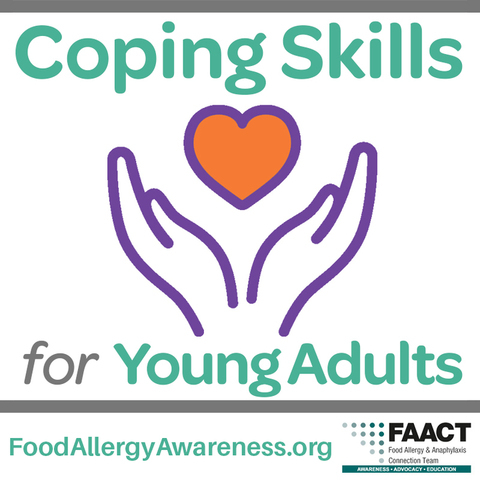For Young Adults

Coping Skills for Young Adults
What are coping skills?
Coping skills are the way a person deals with and processes a stressful situation or emotional issue that comes their way. Coping skills aid a person in how to face the situation, take action, and solve a problem with efficiency.
Why do I need coping skills?
Learning doesn’t stop when you become an adult, and your food allergies certainly do not go away. Life can be stressful on its own, but there are added stressors that exist when you are managing a life with food allergies. This is where coping skills come in. How will you react when your company’s Christmas party is at a sushi restaurant? What will you do if you have a reaction at your college dining hall? How will you react if you are excluded from an outing with your friends because it includes being around your allergens? We all need to learn and develop coping skills to deal with these hard situations in a way that will allow us to process them and move on.
How can I learn to cope?
There are two main types of coping skills: distraction coping skills and problem-solving coping skills. Learning some from each category will help you be able to conquer whatever life throws your way!
Distraction Coping Skills: Distraction coping skills are different from avoidance behaviors because avoidance is a passive tool and only temporary. Distraction, on the other hand, is active and intentional. Taking a break and taking your mind off the problem at hand for several moments or hours can help us long term.
- Take a bath
- Read
- Do a puzzle
- Watch TV
- Go for a walk
Problem-Solving Coping Skills: Problem-solving coping skills go right to the meat of the problem. They help you take meaningful action, refocus your energy, and explore how you truly feel.
- Pray
- Talk to a trusted friend or family member
- Make a pro and con list
- Go to therapy
- Count to 10
- Breathing exercises or mediations (try this 30 second simple “breathe bubble” exercise to get an idea)
- Label your feelings (anxious, tired, sad, worried, frustrated, angry, silly, happy etc.)
- Make a plan
- Complete something you've been putting off
Be careful to also know that while coping skills can be very beneficial, there are also negative ways to cope, which are unhealthy.
Unhealthy coping strategies:
- Over drinking
- Gambling
- Abusing drugs
- Verbal abuse
- Smashing things
- Avoidance/minimizing the situation
Life Declarations:
Learn to make life declarations and incorporate them into your every day. Say them aloud to yourself in the mirror, in your head, write them on notecards or stickies and post them around your house, or whatever works for you.
- Taking care of myself is necessary.
- The world is a better place because I am here.
- I know my own limitations and strengths.
- I seek help when I need it.
- I have the right to feel what I feel and to express those feelings.
- I take pride in my accomplishments and in the courage it took to complete them.
- I cannot control the happiness of another person.
- I have the right of choice, to decide what I will or will not do.
- Insert your own life declaration!

